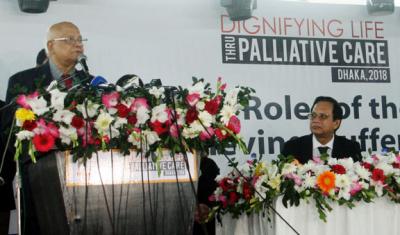DHAKA, Jan 7, 2018 (BSS) – Speakers at a programme today emphasized the need of Palliative care unit at the hospitals of the country to provide dignity and hope to the patients who suffer from life threatening illness.
“Palliative care unit to be introduced in major hospitals of the country to improve the quality of life of patients and their families who are facing problems associated with life-threatening illness,” said the speakers.
They were speaking at a day-long programme on Palliative care unit titled, ‘Physician’s Day: Dignifying Life-Role of the Physicians in Relieving Suffering’ at Dhaka Club in the city organised by Ayat Skill Development Centre (ASDC).
Finance Minister Abul Maal Abdul Muhith was present the programme as the chief guest while Dhaka Medical College and Hospital (DMCH) Director Brigadier General AKM Nasir Uddin, Director of Bangabandhu Sheikh Mujib Medical University (BSMMU) Brigadier General Abdullah-al-Harun, ASDC Chairman Tahsin Aman and experts from home and abroad also spoke, among others.
Speaking as the chief guest, Finance Minister Abul Maal Abdul Muhith said, “As the average life expectancy of the people of the country is around 70 years old, it is crucial to have proper Palliative care units in the country.”
“Therefore the government would take steps to expand the service,” he added.
“Palliative care focuses on a patient, not the disease she or he is suffering from,” Chief patron of Ayat Skill Development Centre (ASDC) Nusrat Feroz Aman told BSS while talking aside.
“Palliative care is an approach that improves the quality of life of patients and their families facing the problem associated with life- threatening illness, through the prevention and relief of suffering by means of early identification and impeccable assessment and treatment of pain and other problems, physical, psychosocial and spiritual,” she added.
The speakers suggested that the government should include palliative care in the curriculum of medical students and nurses, incorporate the healthcare system in the national policy, and take an initiative to build its awareness. They urged the private organization to come and help the government to expand the care unit among hospitals.
According to World Health Organisation 6,00,000 patients require palliative care and support annually in the country.
Besides, with at least 2 family members involved in each of these patients’ care, a globally homogenous development of palliative care could improve the quality of life of 1,200,000 people nationwide, annually.



